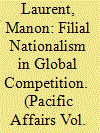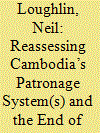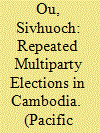|
|
|
Sort Order |
|
|
|
Items / Page
|
|
|
|
|
|
|
| Srl | Item |
| 1 |
ID:
173689


|
|
|
|
|
| Summary/Abstract |
In the early 2000s the Chinese government initiated a profound shift in how it sought to represent China at home and abroad. Whereas many scholars and China watchers argue that a newly assertive China emerged in the wake of the 2008-economic crisis, I argue that this shift took place in the curriculum reforms nearly a decade earlier. An analysis of the evolution of textbooks used for primary Mandarin instruction shows that, starting in 2001, textbooks were developed to inculcate a perennial bond between an increasingly globalized population and its motherland. Specifically, I show how the emergence of “filial nationalism” was crafted in Mandarin-language textbooks, laying the groundwork for a new generation of Chinese youth to simultaneously feel pride for and loyalty to the motherland while preparing them for integration into a globalized world.
|
|
|
|
|
|
|
|
|
|
|
|
|
|
|
|
| 2 |
ID:
173688


|
|
|
|
|
| Summary/Abstract |
This paper aims to capture the complex process through which former socialist North Koreans are remade as South Koreans. I argue that the process by which border crossers from North Korea are remade into post-socialist subjects is complex and multi-dimensional. I address the interlocked nature of institutions and subjectivities in citizen-making processes. On the one hand, it involves the institutionalizations of border crossers with the purpose of screening out “dangerous socialist subjects” for security reasons, followed by “post-socialist” education at Hanawon. On the other hand, it also entails the cultural dynamics of the citizen-making processes. Border crossers are taught not only about political democracy and the economic market, but the cultural learning of resilience to cope with hardship and uncertainty in South Korea. This paper finds two distinctive responses to the cultural learning of resilience—fear and rejection. In this sense, the institutionalizations and the cultural teaching of resilience have unintended consequences. These citizen-making processes raise the question of what characterizes normal subjectivity in a modern, marketized economy. Rather than accepting these normal assumptions as given and natural, this paper tries to uncover hidden assumptions and to problematize the arbitrariness of these normative assumptions. What appears normal, rational, free, and democratic can be actually accidental, temporary, absurd, and socially constructed. This paper attempts to challenge and demystify the meaning of rational, free, democratic, resilient, and normative citizenships that tend to be taken for granted.
|
|
|
|
|
|
|
|
|
|
|
|
|
|
|
|
| 3 |
ID:
173691


|
|
|
|
|
| Summary/Abstract |
Populists in Southeast Asia generally refrain from invoking anti-migrant and anti-minority sentiments as part of their mobilizational strategies. This differentiates them from “exclusionary” populists in Europe, even though many Southeast Asian countries are diverse societies with long histories of migration and ethnic chauvinism. Because the categories of peoplehood that were set alongside the onset of mass politics at independence remain salient today, they constrain contemporary Asian populists’ rhetorical and mobilizational strategies—even in Southeast Asia’s diverse societies. The Southeast Asian experience reveals the importance of historical sequence in nationalist mobilization and mass incorporation in shaping popular identity, citizenship, and membership in contemporary populism.
|
|
|
|
|
|
|
|
|
|
|
|
|
|
|
|
| 4 |
ID:
173687


|
|
|
|
|
| Summary/Abstract |
The dominant literature on Cambodian politics over the past two decades suggested that a mixture of elite and mass clientelism had enabled the hegemonic Cambodian People’s Party (CPP) to rule via competitive but authoritarian elections, while lessening its previous reliance on repression and violence. Such explanations did not predict the upswing in contestation in the country in 2013 and thereafter. Neither do they account for the crackdown that followed. Following literature that draws attention to the tensions in building and maintaining political coalitions under authoritarianism, and demonstrating the difficulties in maintaining competitive authoritarianism over time, this article draws attention to structural, institutional, and distributional impediments to the CPP leadership in building and maintaining effective reciprocal relations with electoral clients while simultaneously balancing the interests of the military and other elites at the core of the regime. To make its argument, the article compares weaknesses in the CPP’s electoral clientelism with the effectiveness of patronage within the security forces, seen through the lens of Cambodia’s experience of land dispossession. It shows that an extractive and exclusive political economy privileged the interests of regime insiders over potential mass electoral clients precisely during the same period the CPP was supposed to be securing its hold on power via mass electoral clientelism. This further explains why the regime fell back on repression over reform in response to the upswing in contestation manifest from 2013, and why, despite the failings of its mass patronage project, repression has nevertheless been successful as a strategy for regime survival during a period of heightened popular contestation.
|
|
|
|
|
|
|
|
|
|
|
|
|
|
|
|
| 5 |
ID:
173690


|
|
|
|
|
| Summary/Abstract |
The United Nations (UN) introduced multiparty elections to Cambodia in 1993 in the hope of bringing about democracy in that country. Ironically, the two-and-a-half decades of uninterrupted elections have led to an ever-more authoritarian government under Prime Minister Hun Sen and the Cambodian People’s Party (CPP). Authoritarianism under the single-dominant party system began in 1997, but has intensified since 2017 with the ban on the leading opposition party. While concurring that repetitive elections have consolidated authoritarianism, this paper argues that elections are not merely tools that authoritarian leaders deploy to hold on to power. Elections are arguably mechanisms that have compelled the CPP to offer several extraordinary economic policy concessions since 2013; this is the first argument of the paper. The developments have created a win-win scenario for the rulers and the ruled—the authoritarian leaders prolong their rule, and the masses have more disposable income, among various benefits. The second argument is that such policy concessions are made only when the ruling party senses critical challenges from the opposition and voters. This paper contributes to the literature arguing that multiparty elections in electoral authoritarian regimes extract economic policy concessions.
|
|
|
|
|
|
|
|
|
|
|
|
|
|
|
|
|
|
|
|
|